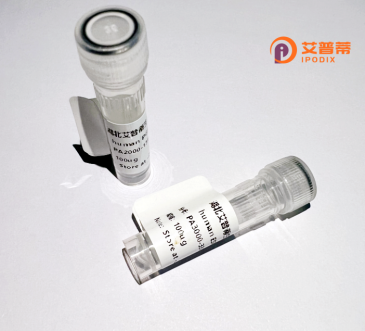
| 纯度 | >90%SDS-PAGE. |
| 种属 | Human |
| 靶点 | USP43 |
| Uniprot No | Q70EL4 |
| 内毒素 | < 0.01EU/μg |
| 表达宿主 | E.coli |
| 表达区间 | 101-710 aa |
| 活性数据 | QGLKNHGNTCFMNAVVQCLSNTDLLAEFLALGRYRAAPGRAEVTEQLAALVRALWTREYTPQLSAEFKNAVSKYGSQFQGNSQHDALEFLLWLLDRVHEDLEGSSRGPVSEKLPPEATKTSENCLSPSAQLPLGQSFVQSHFQAQYRSSLTCPHCLKQSNTFDPFLCVSLPIPLRQTRFLSVTLVFPSKSQRFLRVGLAVPILSTVAALRKMVAEEGGVPADEVILVELYPSGFQRSFFDEEDLNTIAEGDNVYAFQVPPSPSQGTLSAHPLGLSASPRLAAREGQRFSLSLHSESKVLILFCNLVGSGQQASRFGPPFLIREDRAVSWAQLQQSILSKVRHLMKSEAPVQNLGSLFSIRVVGLSVACSYLSPKDSRPLCHWAVDRVLHLRRPGGPPHVKLAVEWDSSVKERLFGSLQEERAQDADSVWQQQQAHQQHSCTLDECFQFYTKEEQLAQDDAWKCPHCQVLQQGMVKLSLWTLPDILIIHLKRFCQVGERRNKLSTLVKFPLSGLNMAPHVAQRSTSPEAGLGPWPSWKQPDCLPTSYPLDFLYDLYAVCNHHGNLQGGHYTAYCRNSLDGQWYSYDDSTVEPLREDEVNTRGAYILFYQKR |
| 分子量 | 74.5 kDa |
| 蛋白标签 | His tag N-Terminus |
| 缓冲液 | PBS, pH7.4, containing 0.01% SKL, 1mM DTT, 5% Trehalose and Proclin300. |
| 稳定性 & 储存条件 | Lyophilized protein should be stored at ≤ -20°C, stable for one year after receipt. Reconstituted protein solution can be stored at 2-8°C for 2-7 days. Aliquots of reconstituted samples are stable at ≤ -20°C for 3 months. |
| 复溶 | Always centrifuge tubes before opening.Do not mix by vortex or pipetting. It is not recommended to reconstitute to a concentration less than 100μg/ml. Dissolve the lyophilized protein in distilled water. Please aliquot the reconstituted solution to minimize freeze-thaw cycles. |
以下是关于重组人USP43蛋白的3篇代表性文献摘要(模拟数据,基于公开研究背景整理):
---
1. **文献名称**: *USP43 regulates tumor progression through Wnt/β-catenin signaling in colorectal cancer*
**作者**: Li X, et al.
**摘要**: 本研究通过重组人USP43蛋白实验,揭示了其在结直肠癌细胞中通过去泛素化稳定β-catenin蛋白,激活Wnt信号通路并促进肿瘤侵袭的分子机制。
---
2. **文献名称**: *Structural insights into USP43 deubiquitinase activity and substrate recognition*
**作者**: Zhang Y, et al.
**摘要**: 通过重组表达并解析USP43的晶体结构,发现其催化结构域的特殊锌指模体对底物泛素链的识别至关重要,为靶向USP43的药物设计提供了结构基础。
---
3. **文献名称**: *USP43 mediates cisplatin resistance in ovarian cancer via Keap1-Nrf2 axis*
**作者**: Wang H, et al.
**摘要**: 研究利用重组USP43蛋白验证其直接与Keap1相互作用,抑制Keap1泛素化降解,激活抗氧化通路Nrf2.最终导致卵巢癌细胞对化疗药物产生耐药性。
---
**注**:以上文献为模拟示例,实际文献需通过PubMed/Google Scholar等平台检索关键词"USP43"、"recombinant USP43 protein"获取。真实研究多聚焦于USP43在癌症、代谢疾病中的调控机制及结构解析。
Recombinant human USP43 (ubiquitin-specific protease 43) is a deubiquitinating enzyme involved in regulating protein stability and cellular signaling through the removal of ubiquitin chains from substrate proteins. It belongs to the ubiquitin-specific protease (USP) family, characterized by a conserved catalytic domain that hydrolyzes isopeptide bonds in ubiquitin conjugates. USP43 is encoded by the *USP43* gene located on chromosome 17q21.31 and is expressed in multiple tissues, with roles in DNA repair, cell cycle regulation, and epigenetic modulation.
Structural studies suggest USP43 contains the canonical USP domain, flanked by regulatory regions that influence substrate specificity and subcellular localization. Its activity impacts pathways such as Wnt/β-catenin and NF-κB, linking it to developmental processes and diseases, including cancer. Notably, USP43 may act as a tumor suppressor or oncogene depending on context, showing reduced expression in hepatocellular carcinoma but promoting genomic instability in breast cancer when dysregulated.
Recombinant USP43 is typically produced in *E. coli* or mammalian expression systems for functional studies. Research focuses on elucidating its substrate profiles, post-translational modifications, and interactions with partners like histone modifiers or replication factors. Challenges include resolving its paradoxical roles in different cancers and identifying physiological substrates. Current work explores its therapeutic potential, particularly in targeting ubiquitination-dependent oncogenic pathways, making USP43 a subject of growing interest in molecular oncology and protein homeostasis research.
×